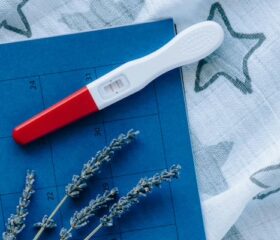Everything You Need to Know About Irregular Periods
Irregular periods are ones that come infrequently or are otherwise outside the norm. They aren’t necessarily a cause for concern, although they can signify a health problem.

To know when you should worry about irregular periods, you need to understand exactly what they are. Read on to learn what constitutes an irregular period, what causes them, and when it’s time to talk to a doctor.
What are irregular periods?
Irregular periods come in many forms. Broadly speaking, they’re periods that last longer or shorter, are heavier, or come less predictably than “normal” periods.
To get specific, you have an irregular cycle if they have any of these characteristics: 1
- Frequency: Your periods start fewer than 21 days apart or more than 35 days apart. 1
- Length: They last less than 3 days or more than 7 days. 2
- Volume: They’re unusually heavy, meaning you pass large clots or have to change your tampon or pad after less than 2 hours. 3
- Regularity: They fail to come for three months straight or don’t start at all by age 15 (this is known as amenorrhea). 4
If you have light bleeding or spotting between menstrual periods, that also means you have an irregular cycle.
Are irregular periods common?
Yes, irregular periods are quite common. Approximately 14%–25% of women who menstruate have them. 1 They’re particularly common during puberty when your periods first begin, as well as when you approach menopause. 4
Common causes of irregular periods
There are a lot of potential causes of irregular periods. While some are linked to larger medical issues, many others are related to your habits or just the stage you’re at in life.
Let’s look at the factors that can cause your period to go off schedule.
Natural life stages
As mentioned, it’s common for periods to be irregular when they first start during puberty (around ages 11–14). Your periods will also become less regular and gradually stop as you transition to menopause (around age 51). The years preceding the menopausal transition are referred to as perimenopause. 4 5
Pregnancy
As you probably know, your periods will stop during pregnancy. In fact, a missed period is often one of the first pregnancy symptoms that moms-to-be get. 6
Your period won’t come back immediately after you give birth. You won’t get your first period after having a baby until about 4–9 weeks postpartum if you’re not breastfeeding, and 3–12 months postpartum if you are. 7
Lifestyle factors
Your daily habits can impact your menstrual cycle. The most common culprits include: 1 4
- Chronic high stress and anxiety
- Significant weight loss or gain
- Intense or prolonged exercise
- Malnutrition and eating disorders (e.g., anorexia or bulimia)
If you’ve been using a period tracker consistently for a while now, you can probably narrow down what lifestyle factor (if any) is triggering your irregularity. However, if you’re unsure about the cause, it’s a good idea to see your doctor.
Medication and birth control
Many forms of hormonal contraception (including birth control pills, injections, patches, and IUDs) can cause irregular periods. That’s because they disrupt your menstrual cycle and may prevent you from ovulating (releasing a fertilized egg) entirely, which is part of what triggers your body to shed its uterine lining.
Certain medications, including for epilepsy and mental health issues like anxiety, can also cause irregular periods. 4
Underlying medical conditions
Some medical conditions are linked to irregular periods, especially hormonal disorders or issues with the reproductive organs.
For instance, polycystic ovary syndrome (PCOS), a condition that’s often associated with irregular or missed periods, is a hormonal disorder that disrupts ovulation. 8
Thyroid disorders can also cause this issue. Producing either too much or too little thyroid hormone can affect the volume and regularity of your periods. 9
Other hormonal or reproductive organ-related conditions
The two issues we just listed are often the first medical conditions people bring up when discussing irregular periods. However, there are other (less common) ones that can disrupt menstruation:
- Pituitary gland disorders: Issues with your pituitary gland (a small gland at the base of your brain) can increase the levels of the hormone prolactin and cause menstrual issues or infertility. 10
- Primary ovarian insufficiency (POI): When the ovaries stop functioning normally before age 40, it can lead to irregular or missed periods. 4
- Endometriosis: When you have this condition, your uterine lining grows outside your uterus. You might experience heavy bleeding, intense cramps before and after your periods, and painful urination or bowel movements during them. 11
- Uterine fibroids or polyps: These tissues are typically non-cancerous, but they can lead to painful, heavy, or long periods. 4
- Pelvic inflammatory disease (PID): This is an infection of the female reproductive organs. It’s often caused by untreated sexually transmitted infections (STIs). It can make your periods very heavy, short, or long. 12
When should you see a doctor about irregular periods?
Again, irregular periods don’t always signify a medical issue. You should see a doctor if your typically normal period suddenly becomes very irregular.
For example, if the bleeding is so heavy that you need to change your pads every 1–2 hours or you notice a lot of large blood clots on your pads, it’s time to see a professional. 42
However, if there’s just a slight change (e.g., your period was a day or two early), you’re likely fine. It’s a good idea to track your period and note down these small changes in your journal, calendar, or period tracker app. If your period becomes more irregular down the line and you do need to see a doctor, this data will be very useful for them.
How are irregular periods diagnosed?
When you visit your doctor, they’ll typically start by asking about your medical history, including your menstrual patterns and any complications you’ve had in the past. They may suggest you take a pregnancy test, a blood test, and a physical examination. 1
If your menses is considered unusually heavy, your doctor will assess if you need further testing, such as a pelvic ultrasound, endometrial biopsy (examination of a small tissue sample from your uterine lining), or hysteroscopy (examination of the inside of your uterus). 1
Common treatments for irregular periods
The appropriate treatment for irregular periods depends on their underlying cause. Not all irregular periods require intervention at all, especially if they’re simply a result of puberty or perimenopause and don’t bring much or any discomfort.
If treatment is necessary, it may involve:
- Lifestyle adjustments: For irregularities linked to stress, weight, or exercise, your doctor might advise you on how to maintain a healthy diet, plan an exercise routine, or manage your stress.
- Medication: This may consist of over-the-counter pain relievers or hormonal birth control (to regulate your cycles, control your pain, or treat heavy bleeding). 4 If there’s a more serious underlying issue, you may require more medication.
- Surgery: If the medication doesn’t work or you have a condition that’s causing you a lot of pain, your doctor may suggest surgery as a last resort. 4
How to manage your irregular periods at home
As mentioned, if your condition doesn’t require medication or surgery, your doctor may recommend simple lifestyle changes to see if they help regularize your cycle. Whatever they suggest, whether it’s eating more nutritious food or just getting more rest, be sure to keep up with your new routine.
If you have abdominal cramps or pain during your period (which is very common), try lessening the pain by: 132
- Putting a hot pad or water bottle on your lower abdomen
- Doing yoga, meditation, or gentle exercise (e.g., walking or stretching)
- Taking a warm bath
If you can’t stand the pain, ask your doctor if you can take over-the-counter pain relievers like ibuprofen.
Irregular periods can make it harder to conceive
It’s possible to get pregnant with an irregular cycle, but determining your fertility window is often more challenging when you have one. That’s because it’s much harder to track your ovulation with irregular periods. You can use ovulation test strips and fertility tracker apps to help, but it’s a good idea to schedule a preconception appointment with your doctor or consult a fertility specialist if you’ve been struggling to get pregnant for a while.
Final thoughts
It’s OK to ignore slight variations in your cycle length or flow every now and then. However, you should be aware of your usual pattern and watch for any significant changes. If you’re ever in doubt about your period, it’s never a bad idea to play it safe and see a doctor.
Article Sources
- Eunice Kennedy Shriver National Institute of Child Health and Human Development. "What are menstrual irregularities?" Retrieved July 1, 2025.
- New Jersey Department of Health. "What to expect" Retrieved July 1, 2025.
- U.S. Centers for Disease Control and Prevention. "About Heavy Menstrual Bleeding" Retrieved July 1, 2025.
- Office on Women's Health. "Period problems" Retrieved July 1, 2025.
- MedlinePlus. "Menstruation" Retrieved July 1, 2025.
- Office on Women's Health. "Knowing if you are pregnant" Retrieved July 1, 2025.
- MedlinePlus. "Vaginal delivery - discharge" Retrieved July 1, 2025.
- MedlinePlus. "Polycystic Ovary Syndrome" Retrieved July 1, 2025.
- Office on Women's Health. "Thyroid disease" Retrieved July 1, 2025.
- MedlinePlus. "Prolactin Levels" Retrieved July 1, 2025.
- New Jersey Department of Health. "Endometriosis" Retrieved July 1, 2025.
- Baby County Michigan. "Pelvic Inflammatory Disease" Retrieved July 1, 2025.
- MedlinePlus. "Period Pain" Retrieved July 1, 2025.






